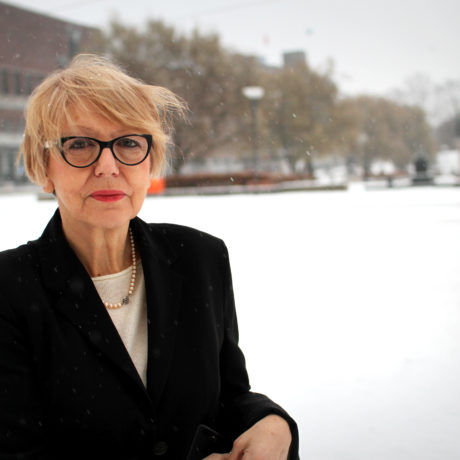Sonja Biserko
This article is a part of the campaign #12 Women on the Barricades, developed by The Norwegian Helsinki Committee in collaboration with illustrator Jenny Jordahl. We present 12 portraits of women standing on the barricades for other women, focusing on the greatest human rights challenges facing women in Europe today – and what needs to be done to overcome them. Read about the 11 other women on www.nhc.no/en/12womenonthebarricades
“I am used to smear campaigns, both during the war and afterwards”, says Sonja Biserko, a veteran human rights activist.
The 71-year-old still fights for human rights in Serbia and in the Balkans.
With her gentle face, short hair and oval glasses, she has become a familiar face in the human rights movements in the Balkans and around the world. She has openly criticised the political elite for their weaknesses in confronting the past, the war and the genocide that was committed, and for the lack of democratic development and respect for human rights. Her criticism affected persons in high positions. She has been receiving threats, been exposed to pressure and smear campaigns. She does not let herself be scared off, and for almost 30 years she has been a moral compass in the region.
“Women have during the last three decades become more active and exposed in the human rights movement, despite the resistance they meet. Women has shown more courage and determination”, she says.
Courage and determination. These two words are also used to describe Sonja Biserko by the ones who know her.
The institutions that disappeared
The war in the Balkans started as a war over state structures and nations. The debates were raging in the end of the 80s and the beginning of the 90s. Sonja was in the middle of it, employed in the Ministry of Foreign Affairs of Yugoslavia. From that position she could witness at close range the dissolution of the Yugoslavian federation.
“I left my post in the Ministry of Foreign Affairs and joined the anti-war movement. The war had affected millions of lives”, she says.

Sonja did not wait for the war to end before she started criticizing the growing nationalism in the Balkans. She was a sharp and clear critic of the nationalistic thinking already before the war crimes were a fact.
At first, the movement Sonja joined was a genuine protest against the war and the politics of Slobodan Milosević, the Serbian war criminal. Later, the movement focused on the massive human rights violations that went on – ethnic cleansing, mass murder, torture, mass rape, and other atrocities.
“As a response to this we started the Serbian Helsinki Committee for Human Rights”, Sonja explains.
She was a passionate supporter of strong institutions. They were now destroyed by the nationalists, who let the mob rule.
“In this way they destroyed not only the institutions of the Yugoslavian federation but also the Serbian institutions. We still live in a state of emergency, without a modern state”, she says.
“An enemy of the state”
Sonja believes the authorities in Serbia and in the Balkans are aware of the potential that exist within the civil society.
“Therefore, they call us “enemies of the state” and “traitors”. The Serbian civil society – in particular the human rights organizations– has become a target of the regime, due to their fight for free and democratic ideas. We are also attacked by the right wing and so-called patriotic groups, because they equate our liberal ideas with Western imperialism”, Sonja says.
Sonja and her likeminded are on a daily basis labelled as “foreign mercenaries”, “Serb-haters” and the like, by these groups.
Death threats as part of the working life
“I was personally put under hard pressure due to my cooperation with the ICTY”, she says.
Sonja was not only met with smear campaigns in the media, but also physical threats. After various internet forums, websites and commentary fields got involved, the campaign against her was intensified. All this contributed to an atmosphere in which any action against her was legitimized.
“In the comment fields, the readers openly suggested various measures that should be taken against me. Some were radical, involving the security service, – such as staging a traffic accident to kill me or infecting me with a deadly virus, but also prosecution for treason or expulsion from Serbia”, Sonja says.
Over the last three decades, women have become more active and exposed in the human rights movement, despite the resistance they meet.
Sonja Biserko
Not a single government official interfered or condemned these assaults. Instead, Sonja was condemned. Some officials and politicians even refused to participate in debates she was invited to.
“Instead of standing up in defence of a human rights defender, Serbia’s officials silently sided with the media campaign against me. That contributed to an atmosphere of lynching”, Sonja says.
The generation that grows up without any clear memories of the wars, with the nationalist rhetoric still present, will be accompanied by the wise and clear voice of Sonja Biserko. Thousands of young people have attended human rights schools and been inspired by hearing her explaining recent past and developments, they have seen her in public, they have met her in the office of the Helsinki Committee and taken part in the committee’s daily work with both Sonja and other important human rights defenders. Together they have laid the foundation for a world which is different than the one today’s politicians are talking about.

